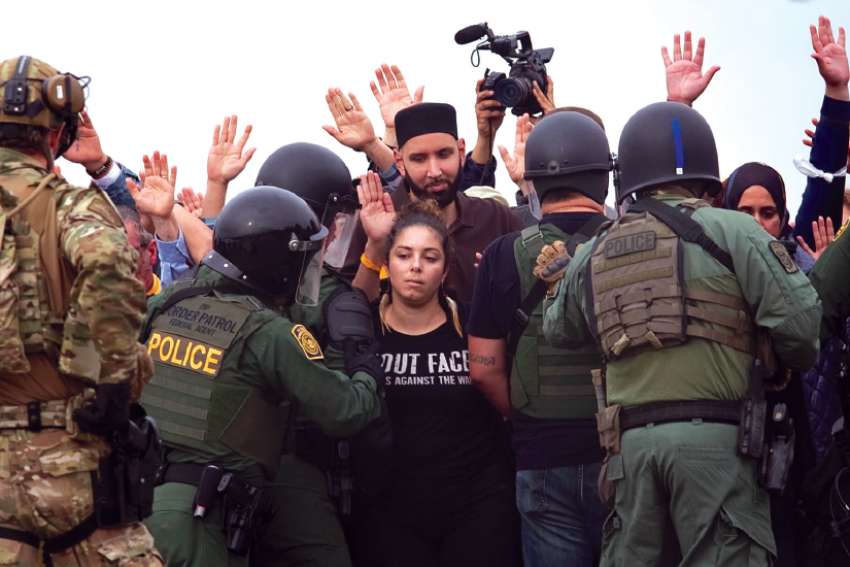A group gathered to protest Canada’s decision to join with the Vatican and 163 other countries in signing the UN Global Compact for Safe, Orderly and Regular Migration. The protest was met by counter-protesters. The two groups were separated by riot police and metal barricades. Despite efforts to keep the peace, nine people ended up being arrested and one was charged with assaulting an officer.
A quick news search revealed that protests took place not only in Ottawa, but in other parts of Canada as well, including Edmonton, Halifax and Regina.
How upsetting to think that something as innocuous as a UN effort to build co-operation between countries in responding to the growing global migration crisis could become a flashpoint even in Canada. To try and understand the issues the protesters were raising, I went back to read the draft outcome of the conference in Marrakech where the compact was signed.
Did it threaten the notion of national sovereignty that has basically been a defining characteristic since the peace of Westphalia in 1648? No. It says clearly in point 15 (c), “The Global Compact reaffirms the sovereign right of States to determine their national migration policy and their prerogative to govern migration within their jurisdiction, in conformity with international law.”
Is the compact a binding instrument of international law? No. It is, to quote from 15 (b), “non-legally binding co-operative framework…. Its authority rests on its consensual nature, credibility, collective ownership, joint implementation, follow-up and review.”
As a Catholic, I was pleased Canada saw the need to co-operate with other countries on this important issue. Doing so aligns with the values espoused by the global Caritas campaign “Share the Journey” — a campaign my colleagues and I have been working on since the fall.
The Vatican, under its Migrants and Refugees section of the dicastery for integral human development, was a contributor to the consultation process for the compact. Pope Francis’ approach to migration is captured by four simple actions, “welcome, protect, promote and integrate.” The dicastery expanded these four into 20 action points as its contribution to the process. At least 15 of these were included in the 23 objectives of the compact’s final draft.
Vatican Secretary of State Cardinal Pietro Parolin said the compact comes at a “crucial moment in history ... more people are on the move than ever before.” He went on in his address at the Marrakech conference to say, “As we have seen in recent years, when these challenges are not managed well, crises can form, rhetoric can eclipse reason, and migrants can be seen more as threats than as brothers and sisters in need of solidarity and basic services.”
Rhetoric can eclipse reason. The compact is a flashpoint. This cannot be denied. Significant absences from the signatories include the United States, Australia, Austria and Poland among others. In Belgium, where violent protests occurred in Brussels, the government lost its majority when a party quit the country’s coalition government over Belgium’s decision to sign the compact.
What is a Catholic to do? An appeal to the facts in order to discredit and dismiss those who are reacting against the compact appears to me not to be useful. Neither does it seem useful to simply point to the Church’s support for the compact and the Gospel values that undergird that support. The reaction against the compact is essentially a reaction against migrants. It has to be placed in the wider context of populist revolts taking place around the world. Anti-migration is a hallmark of that movement.
I believe the global populist revolt is an extremely complex phenomenon to unpack, but one of its defining characteristics is fear. We need to address that fear.
The words of St. John Paul II come to mind, “Be not afraid.”
This is what I want to say to opponents of the compact. I see your fear. I see that you worry welcoming our brothers and sisters from around the world will destroy the world you hold dear.
Nevertheless, “Be not afraid.” God loves you, just as God loves the migrant who wants to cross your border. God is calling you to an encounter that will change your life and mine. You do not need to fear that change.
So put down the fear that you wield like a weapon. Let go of that fear and let us talk with one another as the brothers and sisters that we are. Together we will find a way.
(Stocking is Development and Peace Deputy Director of Public Awareness & Engagement, Ontario and Atlantic Regions.)


